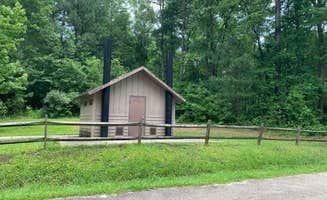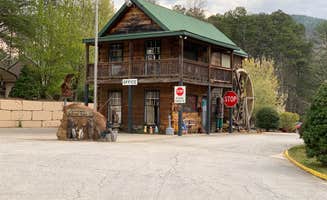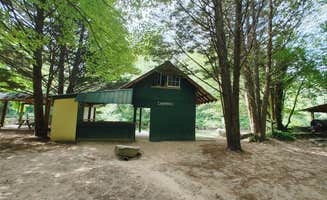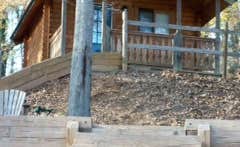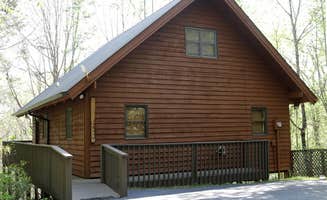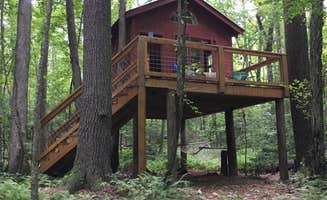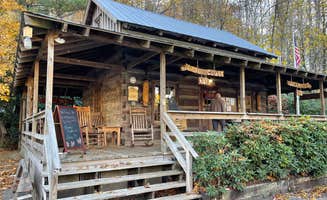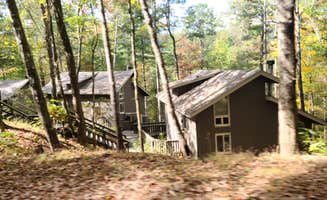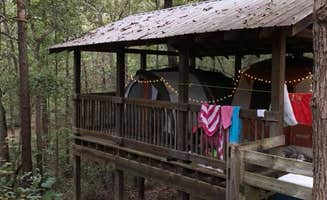Cabins near Toccoa Falls range from rustic shelters to fully equipped lakeside accommodations. Most campgrounds in this North Georgia region sit at elevations between 1,400 and 3,500 feet, creating moderate temperatures that average 10-15 degrees cooler than surrounding lowlands. Winter nights often drop below freezing while summer daytime temperatures typically remain in the 80s, making spring and fall popular for cabin rentals when colorful foliage enhances the forested landscape.
What to do
Tubing access from campsites: At River Falls at the Gorge, many riverside sites offer direct water access. "The river is perfect for tubing. It is just a 30 min drive to Helen Ga which is a very popular area for tourism," notes one camper who adds that "every day the river changes because of the dam upstream. Sometimes it's almost a trickle and you can venture out on the huge rocks and other times it's almost a whitewater adventure although still safe for tubing."
Hiking varied terrain: Black Rock Mountain State Park Campground offers multiple trails with elevation challenges. "The Tennessee Rock trail seems to be the most popular, but let me warn you -- it was NOT as easy as we expected... its narrow and very slippery in spots, with more elevation changes than you expect," explains a visitor. Another adds, "We did the Sassafras Loop trail which follows the lake shore most of time and great views the rest."
Beach swimming access: Lake Hartwell State Park Campground provides dedicated swimming areas at multiple lakefront sites. "Most campsites have views of the lake and access directly to the stoney beaches," mentions one reviewer. Another family notes that "sites T3 through T8 offer all but sewage hookups with good RV sites right along the river."
What campers like
Private lakefront sites: At Don Carter State Park Campground, cabin and tent options offer different water proximity levels. "Site 7 is separate from the others and has the whole point except there is a trail behind the site," notes one camper. The primitive tent sites provide peaceful experiences: "Deer were grazing in the primitive camp zones" and "spacing was great" with "fire rings and picnic tables."
Communal cabin environments: Group camping facilities at Oconee State Park Campground accommodate larger gatherings. "The group campground includes 4 shelters with bunks, a pit toilet and outdoor shower, a grill, fire pit, and a little cabin with electricity," explains a visitor. Another adds that cabins are "scattered around the lake but they are a good distance apart from each other so you won't be disturbed by your neighbors."
Evening wildlife viewing: Cabins near water edges offer natural animal observation opportunities. "From 6 in the evening and beyond you will find deer grazing in late summer and early fall, also raccoons and other small animals can be spotted roaming in some of the open areas," reports a camper. Another adds that "lots of stars at night" are visible from lakeside sites.
What you should know
Limited cellular service: Many cabins exist in signal-weak areas. "I have Verizon and I had one bar here. Enough to send/receive a text but that's about it," notes a Lake Russell visitor. Another camper mentions there was "little cell reception and no TV reception" at their campground.
Seasonal availability limitations: Tallulah Gorge State Park Campground requires advance planning during peak seasons. "The group campsite was better than my field lab group could've imagined," but cabins fill quickly since "it was spring break when we went but it was not overwhelming." Winter visitors should note some facilities reduce operations: "We did not use the pool area or bath houses."
Varying kitchen provisions: Cabin kitchens range from fully equipped to minimal. "There was air conditioning, 2 bedrooms, 1 full kitchen, 1 full bathroom, and a fire place," notes one cabin visitor. Others mention "cabin with electricity but no water" where "the spigot is right outside" for primitive options.
Tips for camping with families
Look for playground proximity: Several cabins sit near dedicated play areas. "The campground itself has an indoor and outdoor pool, a clubhouse, a basketball court and playground equipment," states one family. Another adds, "There is also a beach for the kids to play at as well, very well kept."
Consider bathhouse distances: When booking cabins with children, note facility spacing. "Bath houses were decent. Water was located throughout the campgrounds," reports a parent. Another family mentions, "The campsite was better than my field lab group could've imagined! The site included 4 shelters with bunks, a pit toilet and outdoor shower."
Seek cabin clusters for multi-family trips: River Campground, LLC offers grouped accommodations. "The campground is set up for RVs, primitive tent sites, covered tent shelters, and cabins that are for rent right on the river," explains a visitor. For larger gatherings, "they also offer indoor and outdoor showers and have a recreation building along with a park for the kids."
Tips from RVers
Tight turnarounds in older parks: Cabin-equipped campgrounds often present navigation challenges. "Any trailer longer than 25 feet is tight getting to back sites," warns one RVer about mountain campgrounds. Another adds, "Getting to the campsites is pretty tight but once you are parked, it is just beautiful overlooking the lake."
Electric service variations: Not all cabin and RV sites provide equal power. "Electric 30amp and Water only. Dump station has easy access," notes one RVer. Others mention both "50-amp hookups" and "30-amp hookups" availability depending on the specific campground.
Gray water handling: Lakeside sites often have specialized waste systems. "Nice having grey tank connection at the sites," reports one camper. Another mentions "grey water dumps near each site" as a convenience feature at Tugaloo State Park Campground.


